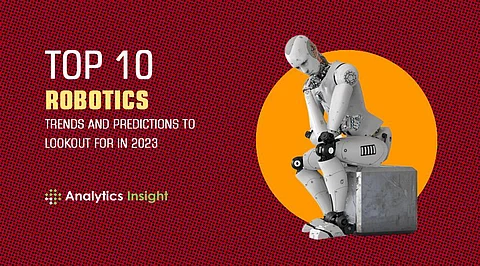

The increased demand for industrial automation, digitalization, and sustainability is met by emerging robotics trends and predictions. Material handling in warehouses is automated by autonomous mobile robots (AMRs) and automated guided vehicles (AGVs). In the robotics industry, there is a lot of effort and investment in robotics cyber security, and drones.
A sample of 8,949 worldwide start-ups and scale-ups for robotics trends for 2023 in-depth study on the Top Robotics Trends & Predictions were studied. This study provides data-driven innovation intelligence that enhances strategic decision-making by providing an overview of start-ups and developing technologies in the robotics sector. These insights were obtained by utilizing the 2,500,000+ start-ups & scale-ups globally to cover the robotics trends and predictions in 2023. The SaaS platform gives you the ability to rapidly and thoroughly identify pertinent start-ups, new technologies, and future industry trends because it is the largest source of data on emerging companies.
In manufacturing, workers are exposed to risky scenarios like toxic chemicals, confined spaces, or heavy machines. They use sensors, artificial intelligence, and computer vision to comprehend their immediate surroundings and navigate on their own. To monitor stock levels and automate material handling, warehouse AMRs, for instance, use scanners. This prevents inventory from running out. To speed up processes and spare workers from moving heavy carts, AMRs also transport sub-assemblies and parts over great distances inside plants.
Robots can use real-time information and optimize jobs thanks to the incorporation of AI into robotics. Large datasets and real-time data are also used to teach the robots to become more accurate and effective. They are therefore better able to sense their surroundings and distinguish objects more quickly, allowing them to navigate independently.
In contrast to traditional industrial robots, cobots, or collaborative robots, have cutting-edge sensors and algorithms that assure safe behavior around people. To automate assembly activities like part welding and screw drilling, they primarily take the form of end-of-arm tooling (EOAT). These robots lift hazardous objects for human employees, such as heavy metals, polymers, and other materials.
Robot development and maintenance is an expensive and time-consuming procedure. Due to these limitations, a lot of organizations, particularly small businesses, are unable to incorporate robotics into their operations.
Robotics is prime targets for cyber attacks due to the IoT's integration and the increased demand for connectivity. In addition, safeguarding robotic solutions against illegal access is necessary due to the deployment of robotics in the defence, manufacturing, healthcare, and space industries. Robotic cyber security solutions secure endpoints and connection stacks to prevent data breaches and asset outages.
Start-ups are now able to construct drones with greater range and capabilities because of developments in edge computing, HPC, and connection technologies. They use them to carry deliveries, gather aerial data, examine infrastructure, and more across a variety of businesses. Contrarily, agricultural drones can distribute pesticides and plant seeds at specific locations while tracking crops and keeping an eye on the movement of cattle. Drones' adaptability hastens their integration into last-mile delivery of goods like groceries and medical supplies.
Robotics focuses on manufacturing, interaction, and autonomous behavior whereas the Internet of Things (IoT) provides sensing, monitoring, and tracking. The performance of connected robots is driven by edge computing platforms, which enable feedback-driven workflows by collecting and sending data there. Manufacturers of robots are now able to relocate computing closer to the data source thanks to recent advancements in edge IoT. This makes it possible for robotic systems to use data that is nearly real-time and maximize task efficiency.
Humanoid robots are increasingly being used in the post-pandemic world for tasks like contactless cleaning and in-hospital deliveries. Additionally, they are used in power plant inspections, maintenance, and recovery operations from disasters, saving human personnel from dangerous conditions. Along with serving as hosts and welcoming guests at the front desk, they also visit the sick and old. They automate jobs as do other robots to reduce expenses and boost production.
Materials are typically transported by AGVs, also known as self-guided vehicles, in warehouses, distribution centres, and production facilities. Their movement is controlled by a combination of software and sensor-based navigation systems that follow a predetermined path.
People with a range of abilities benefit more and more from the independence and quality of life that assistive robots provide. To sense, process, and communicate with people, they use sensors and clever algorithms. They are now able to live securely and independently in their own homes.
Join our WhatsApp Channel to get the latest news, exclusives and videos on WhatsApp
_____________
Disclaimer: Analytics Insight does not provide financial advice or guidance. Also note that the cryptocurrencies mentioned/listed on the website could potentially be scams, i.e. designed to induce you to invest financial resources that may be lost forever and not be recoverable once investments are made. You are responsible for conducting your own research (DYOR) before making any investments. Read more here.
